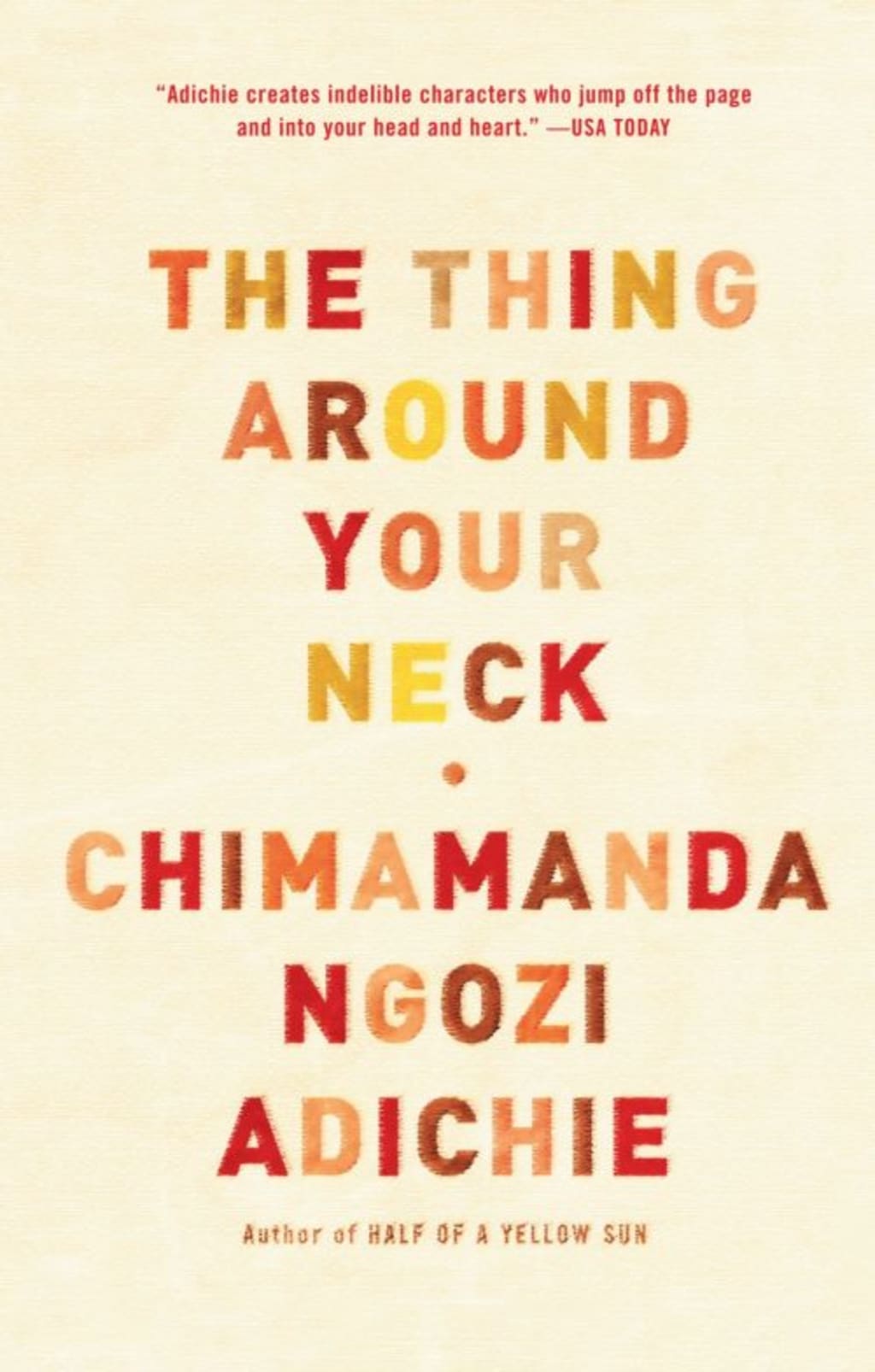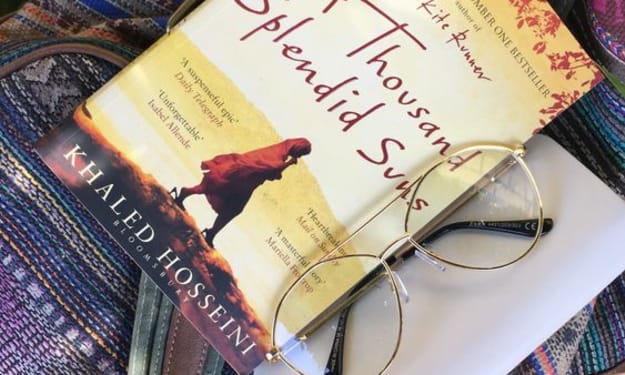THE THING AROUND YOUR NECK.
A collection of 12 short stories following the lives of different African individuals.

I picked up this short novel collection because of Chimamanda Ngozi Adichie’s fantastic TED Talk on “The danger of a single story” (which, by the way, is a must-watch!) I stumbled upon it when I was trying not to doze off during my English class. I am fascinated by how Adichie mentioned the importance of diverse narratives, and how stories can both empower and control us. I became curious about how she weaves her own experiences, identity struggles, and immigration stories into her writing.
The book is a refreshing read, with twelve intriguing short stories with complex characters, dealing with clashes of values, the aftermath of colonial history, societal expectations, and identity dilemmas. My favorite story is “The Thing Around Your Neck”. Its subtle portrayal of the challenges faced by a Nigerian female immigrant is both heartbreaking and thought-provoking. Each short story is an easy read, completely standalone from the others, and would not take longer than half an hour to finish. It has some of the most memorable plot twists, lovable characters, and (surprisingly) relatable narrators.
The "thing around your neck" is symbolic of anxiety or worry, also a major theme of the story. In the story, the second-person narrator says, "The thing that wrapped itself around your neck, that nearly choked you ... started to loosen." "The thing" is a metaphor for anxiety, or dread, and causes troubled sleep. It is a feeling shared by many characters in the stories.
The story "The Thing Around Your Neck" is told from the second-person point of view, which puts readers inside the story and allows them to see through the character's eyes and feel the character's emotions. This viewpoint is used to great advantage in the story, as readers are just as likely to be similar to Akunna's privileged boyfriend as to Akunna herself.
Akunna was nearly raped by a person who was meant to care for her, and through that experience, the quid pro quo nature of relationships and advancement for women in the United States becomes clear to her. She worries about being successful in America, as her family believes Americans to be. She worries about measuring up to her boyfriend, who comes from a privileged background. Her anxiety also comes from a lack of choices, a consequence of being a woman and an immigrant. She can choose to leave her abusive uncle—and she does—but in doing so she loses other privileges, such as going to school. Because she now must make her way, she is held back because of finances.
Akunna's choice is the one chosen less frequently because it requires courage and independence. Many of the women in these stories have been raised to be dependent and submissive. Consequently, remaining in a bad situation is preferable to being on their own with no means of support. The idea of a woman having no choice or making a difficult choice that will mean giving up security occurs in several other stories in the book.
In "Jumping Monkey Hill" Ujunwa similarly gives up a hard-won job because it will require taking care of clients in sexual ways. However, in "The Arrangers of Marriage" Chinaza chooses to stay in a sham marriage until she can be in a situation that will allow her to do otherwise. This decision may be viewed as either more sensible or more cowardly. In "Imitation" Nkem makes a statement, but how effective it will be is not known.
Akunna cannot understand her boyfriend's privileged attitude, his worst problem being loving parents who would like him to continue school, at their expense. She contrasts his situation with her upbringing, where she had to watch her father humiliate himself over a rich man's car. She knows this is the sort of easiness she should want, yet she doesn't respect it or respect him. His vomiting when he eats real African food suggests his inability to fit into her world.
Once again, the theme of racism is prevalent. Akunna's employer assumes she will be a good worker because she is an immigrant. Although this assumption seems to suggest he favors her for being African, such expectations are a form of racism. Similarly, the uncle in Maine was hired by his company as a token so they can appear to be diverse. Also, people assume Akunna and her boyfriend can't be a couple because of their different races. Akunna herself is just as leery of people who like Africa as of those who don't. Some people fetishize Africa, thus showing behavior that is much like expecting her to be a model employee.
Disillusionment with the American dream is another theme in this story. Akunna expected instant success when she arrived. Instead, she is attacked by her uncle, has to flee to a place where she can't afford to go to school, and feels scorned. She doesn't write to her family because she doesn't want to admit how badly she has failed when, in fact, it is America that has failed her. The American dream is a sham.
In addition to the thing around your neck as a metaphor for anxiety, the brown envelope reflects secrecy and shame. Her mother used them to bribe her son's teachers. Akunna now uses the same type of envelope to send money to her mother without revealing what she views as her failure. In addition, the blank fortunes represent an uncertain future—or perhaps a lack of one. In the end, Chimamanda Ngozi Adichie leaves readers in some doubt about Akunna's return to America and her boyfriend. Akunna refuses to let him accompany her to see her family, realizing he wouldn't fit in. She has said he doesn't understand, and the final words of the story, "and then you let go," imply Akunna likely will not return.
If you ask anyone who loves Adichie, they will tell you that her storytelling ability is one thing that truly sets her apart from the rest. This certainly shines through in The Thing Around Your Neck, her first short story collection, in which she crafts whole lives out of just a few short pages and makes them disappear again in an instant.
I wholeheartedly recommend this book for a witty and enjoyable leisure read. Plus, it deepened my understanding of feminist theory and postcolonial analysis. The detailed description of the clash of classical Western epistemological frameworks and traditional indigenous values is also a good complement to traditional texts required in political theory.
About the Creator
Catherine Nyomenda
I love writing. I love the swirl of words as they tangle with human emotions. I am a flexible writer and can write almost anything, do you need any help creating content? Well then, get in touch...
Enjoyed the story? Support the Creator.
Subscribe for free to receive all their stories in your feed. You could also pledge your support or give them a one-off tip, letting them know you appreciate their work.






Comments (3)
Chimamanda is quite fascinating, Your review is so wonderfully crafted, such painful, yet gainful insights.
Catherine Nyomenda your review effectively captures the essence of "The Thing Around Your Neck" and provides readers with a thoughtful and informative assessment. Well done!
Oh I love that the stories are told from a second person point of view. The thing around your neck is a brilliant metaphor for anxiety because that's how it actually feels! Thank you so much for sharing about this book!